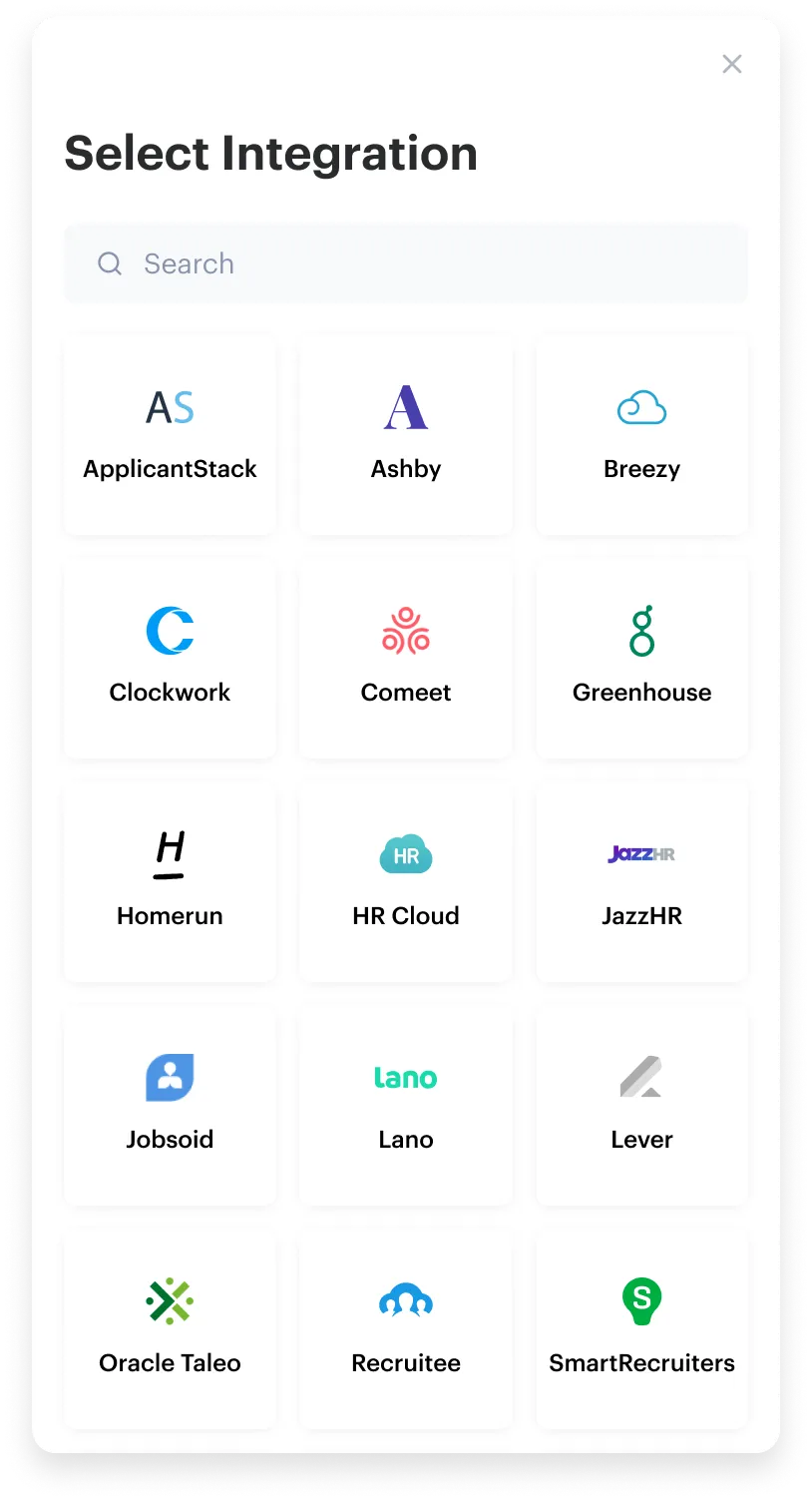Integrate Lever with your product—along with any other ATS application
Connect your product to all the applications your customers use via Merge's Unified API to close more deals, retain customers, and expand to new markets








Sync Lever data
FAQ on integrating with Lever API
How much does it cost to integrate with Lever using Merge?
It depends on the plan you select.
Merge offers a Launch Plan, which allows you to access up to 3 free Production Linked Accounts, but you'll need to pay $65 per additional Linked Account.
To access more advanced features, comprehensive support, bulk discounts for Linked Accounts, and more, you can use either Merge’s Professional or Enterprise plan.
Visit Merge’s pricing page for more information.
Which security regulations and standards does Merge comply with?
Merge complies with SOC 2 Type II, ISO 27001, GDPR, CCPA, and HIPAA. Merge’s infrastructure is also designed to meet strict security and privacy standards, ensuring data protection and regulatory compliance across all integrations.
How does Merge interact with Lever's API endpoints?
Merge can make GET, POST, and PUT requests to access and update data related to candidates, applications, job postings, interviews, and more. For example, Merge can pull data, such as candidates’ contact information, application statuses, and job stages.
How does Merge manage syncing frequencies with Lever?
Merge allows you to sync Lever data at various intervals, including manual, daily, standard (1 to 6 hours), high (10 minutes to 6 hours), and highest (1 minute to 3 hours) sync frequencies. Depending on your plan, you can customize the sync to match your business needs, ensuring data is up-to-date. You can also trigger a force resync if necessary for urgent data refreshes.
Learn more about Merge’s sync frequencies for Lever here.
What if I need real-time data from Lever?
For real-time data updates, you can set up automatic webhooks, allowing Lever data to sync instantly into your system as events occur.
What other ATS integrations does Merge support?
In addition to Lever, Merge supports more than 50 ATS integrations through its ATS Unified API. Some of the other popular ATS platforms Merge supports include Greenhouse, Jobvite, BambooHR, iCIMS, SmartRecruiters, Ashby, and Workable.
How does Merge normalize data from Lever?
Merge maps data from Lever to its standardized ATS Common Models, such as Candidates, Applications, Jobs, and Users. This process ensures consistent data formatting across different ATS platforms, allowing you to access and manage Lever data in the same structure as data from other ATS integrations, like Greenhouse and Jobvite.
New Year's Day - 1/1/2024Memorial Day - 5/27/20244th of July - 7/4/2024Labor Day - 9/2/2024Thanksgiving Day - 11/28/2024Day after Thanksgiving - 11/29/2024Christmas Eve - 12/24/2024Christmas Day - 12/25/2024

Trusted to power integrations at
























Make integrations your competitive advantage
More sales, less code, fewer headaches
Focus on your core product
Stop diverting your engineers to yet another integration and let them get back to work.
Give customer success a break
Manage your simplified integration issues in a single pane. No therapist required.
Stop losing sales due to integrations
Launch integrations in days, not quarters. Your sales team will thank you.
.png)

Integration authentication that feels like magic
Merge seamlessly manages authentication and authorization on behalf of your customers.
Offer account linking and permission controls to your users with Link for a customizable frontend or with Magic Link for URL-based authorization
The toolkit for all your integration needs
We make integrations painless with accessible API design, dead-simple SDKs, and beautiful documentation that we agonize over.
1from merge import Merge
2
3client = Merge(
4 account_token="YOUR_ACCOUNT_TOKEN",
5 api_key="YOUR_API_KEY",
6)
7client.hris.employees.list()import { MergeClient, Merge } from '@mergeapi/merge-node-client';
const merge = new MergeClient({
apiKey: 'YOUR_API_KEY',
accountToken: 'YOUR_ACCOUNT_TOKEN',
});
employee = await merge.hris.employees.list()
ApiClient.instance.authentications.tokenAuth = {
type: 'bearer',
accessToken: 'API_KEY',
};
new EmployeesApi().employeesList('ACCOUNT_TOKEN', {}, (data) => {
console.log(data);
});import (
"context"
"fmt"
merge "github.com/fern-api/merge-go"
mergeclient "github.com/fern-api/merge-go/client"
"github.com/fern-api/merge-go/hris"
)
client := mergeclient.NewClient(
mergeclient.ClientWithAuthApiKey("<YOUR_API_KEY>"),1ApiClient client = Configuration.getDefaultApiClient();
2client.setBasePath('https://api.merge.dev/api/ats/v1');
3ApiKeyAuth tokenAuth = client.getAuthentication('tokenAuth');
4tokenAuth.setApiKey('API_KEY');
5CandidatesApi apiInstance = new CandidatesApi(client);
6apiInstance.candidatesList('ACCOUNT_TOKEN');import com.merge.api.MergeApiClient;
import com.merge.api.resources.hris.employees.requests.EmployeesRetrieveRequest;
import com.merge.api.resources.hris.types.Employee;
MergeApiClient mergeClient = MergeApiClient.builder()
.accountToken("ACCOUNT_TOKEN")
.apiKey("API_KEY")
.build();
Employee employee = mergeClient.hris().employees().list(
EmployeesRetrieveRequest.builder()
.includeRemoteData(true)> {
"id": "0958cbc6-6040-430a-848e-aafacbadf4ae","remote_id": "19202938","employee_number": "2","company": "8d9fd929-436c-4fd4-a48b-0c61f68d6178","first_name": "Dirna","last_name": "Emanuel","display_full_name": "Dirna Emanuel",
"username": "dirnaemanuel",
"groups": [

Case study
%201%20(1).webp)
How Drata increases customer value and spends 80% less time managing integrations
Working with Merge’s Unified API and beautiful React component took less than a sprint to integrate, test, and release.
Supported ATS platforms
Make integrations your competitive advantage
Stay in touch to learn how Merge can unlock hundreds of integrations in days, not years











































































